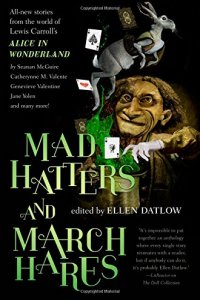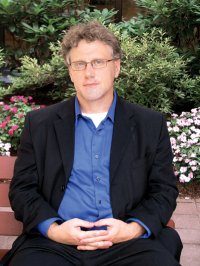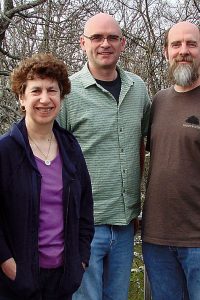Jay Lake: Specific Gravity
 Jay Lake began to write seriously in 2000, when he joined the Wordos writing group. First story ‘‘The Courtesy of Guests’’ appeared in September 2001, and he soon became one of the most prolific writers in the field, publishing over 250 stories to date, including Hugo nominee ‘‘Into the Gardens of Sweet Night’’ (2003) and novellas The Baby Killers (2009) and The Specific Gravity of Grief (2010). His stories have been collected in Greetings from Lake Wu (2003, illustrated by Frank Wu), Green Grow the Rushes-Oh (2003), American Sorrows (2004), Dogs in the Moonlight (2004), The River Knows Its Own (2007), and The Sky That Wraps (2010).First novel Rocket Science appeared in 2005. Other books include the City Imperishable sequence: Trial of Flowers (2006) and Madness of Flowers (2009); the Mainspring series: Sidewise Award nominee and Campbell Memorial Award finalist Mainspring (2007), Escapement (2008), and Pinion (2010); the Green series: Green (2009), the forthcoming Endurance (2011) and Kalimpura (2012); and Death of a Starship (2009). He is currently working on an ambitious space opera, the Sunspin sequence.
Jay Lake began to write seriously in 2000, when he joined the Wordos writing group. First story ‘‘The Courtesy of Guests’’ appeared in September 2001, and he soon became one of the most prolific writers in the field, publishing over 250 stories to date, including Hugo nominee ‘‘Into the Gardens of Sweet Night’’ (2003) and novellas The Baby Killers (2009) and The Specific Gravity of Grief (2010). His stories have been collected in Greetings from Lake Wu (2003, illustrated by Frank Wu), Green Grow the Rushes-Oh (2003), American Sorrows (2004), Dogs in the Moonlight (2004), The River Knows Its Own (2007), and The Sky That Wraps (2010).First novel Rocket Science appeared in 2005. Other books include the City Imperishable sequence: Trial of Flowers (2006) and Madness of Flowers (2009); the Mainspring series: Sidewise Award nominee and Campbell Memorial Award finalist Mainspring (2007), Escapement (2008), and Pinion (2010); the Green series: Green (2009), the forthcoming Endurance (2011) and Kalimpura (2012); and Death of a Starship (2009). He is currently working on an ambitious space opera, the Sunspin sequence.
Lake is also an accomplished anthologist. He co-edited the first sixth volumes of the Polyphony series with Deborah Layne (2002-2006), All-Star Zeppelin Adventure Stories (2004, with David Moles), TEL: Stories (2005), Spicy Slipstream Stories (2008, with Nick Mamatas), The Exquisite Corpuscle (2008, with Frank Wu), Other Earths (2009, with Nick Gevers), and Footprints (2009, with Eric T. Reynolds).
He was a World Fantasy Award finalist in 2004 and 2005 for editing Polyphony, and won the John W. Campbell Award for Best New Writer in 2004.
In 2008, Lake was diagnosed with colon cancer. Though that mass was successfully removed, he later developed tumors in his lung and liver, which led to three more major surgeries and two courses of chemotherapy, the latter currently ongoing.
Website: Jay Lake
 ‘‘I think I wrote about a quarter-million words of first draft last year, while being on chemo for six months and having liver surgery last September. If you look at it as a year’s productivity, that’s excellent despite my spending a quarter of the year lost in a fog and frankly not running at capacity the rest of the time. So the cancer has eaten my life, and it has also come out in my writing. Near the beginning of Pinion, the third Mainspring book, Boaz (the Brass Man who appears in the second book, Escapement) finds one of Solomon’s Seals and puts it into his own abdomen for safekeeping. The seal won’t come back out, and it rants at him all through the book in this quasi-apocalyptic, quasi-religious manner. It wasn’t until after I finished writing the book and was doing copy-editing that I realized I had given that character my cancer: he had this evil thing in his gut that would not go away and was tearing him down. (Thank you, Doctor Freud.)‘‘Chemo also stole my reading brain. What I figured out I could do is read familiar material, not new things, so I reread all of Discworld and Bujold’s Vorkosigan saga. That probably helped to inspire the project I’ve been working on since last December, this massively ambitious space-opera thing. I began it knowing there’s an almost even chance that I’m going back into treatment later this year, and if I do I’ll lose another year – not a year of writing, but essentially a year of my life. Almost everything I’m writing now seems to be more about loss and death, in a grim, morbid way. I’m not trying to be like Barry Malzberg, but my awareness of mortality, and my awareness of the fragility of life and health, is definitely there in my fiction in a way that it didn’t use to be. The Sunspin trilogy I’m working on right now has in its backstory an event, essentially an alien invasion, that kills half a trillion human beings.”
‘‘I think I wrote about a quarter-million words of first draft last year, while being on chemo for six months and having liver surgery last September. If you look at it as a year’s productivity, that’s excellent despite my spending a quarter of the year lost in a fog and frankly not running at capacity the rest of the time. So the cancer has eaten my life, and it has also come out in my writing. Near the beginning of Pinion, the third Mainspring book, Boaz (the Brass Man who appears in the second book, Escapement) finds one of Solomon’s Seals and puts it into his own abdomen for safekeeping. The seal won’t come back out, and it rants at him all through the book in this quasi-apocalyptic, quasi-religious manner. It wasn’t until after I finished writing the book and was doing copy-editing that I realized I had given that character my cancer: he had this evil thing in his gut that would not go away and was tearing him down. (Thank you, Doctor Freud.)‘‘Chemo also stole my reading brain. What I figured out I could do is read familiar material, not new things, so I reread all of Discworld and Bujold’s Vorkosigan saga. That probably helped to inspire the project I’ve been working on since last December, this massively ambitious space-opera thing. I began it knowing there’s an almost even chance that I’m going back into treatment later this year, and if I do I’ll lose another year – not a year of writing, but essentially a year of my life. Almost everything I’m writing now seems to be more about loss and death, in a grim, morbid way. I’m not trying to be like Barry Malzberg, but my awareness of mortality, and my awareness of the fragility of life and health, is definitely there in my fiction in a way that it didn’t use to be. The Sunspin trilogy I’m working on right now has in its backstory an event, essentially an alien invasion, that kills half a trillion human beings.”
…
‘‘I’ve had this idea for a space opera trilogy for several years, and I was actually writing the outline for the last couple of years, in bits and pieces. But last December I sat down and really hammered it out, this humongous outline, like 140 pages long. I have a hundred pages of back story and detail (historical essays) and about 40 pages of synoptic outline, across the three books of the trilogy. The way I’m writing it is by dividing it into three books, and then dividing each book into thirds. Essentially I’m writing nine 60- to 80,0000-word novels that fit together.
‘‘This is a concession, in part, to my health. I have another cancer scan coming up, and even if that goes poorly I can get the first three chunks done before I go into treatment – that’s enough for my agent to market. If I don’t have to go into treatment, I will probably be able to get the entire project done before I next risk going into treatment.
 ‘‘In the meantime, instead of writing this book straight through, head down, every day, like I’ve written most of my books, almost every time I sit down to write I have to go back to the outline and see where I am. Different characters in different plotlines are more or less aware of what’s going on at each point in the story, so Character A has to work through a story problem before Character D encounters the result of Character A’s behavior. Everything has to line up. And I go back and forth between outline and manuscript, which is so unlike me. It’s radically unlike anything I’ve ever done before.
‘‘In the meantime, instead of writing this book straight through, head down, every day, like I’ve written most of my books, almost every time I sit down to write I have to go back to the outline and see where I am. Different characters in different plotlines are more or less aware of what’s going on at each point in the story, so Character A has to work through a story problem before Character D encounters the result of Character A’s behavior. Everything has to line up. And I go back and forth between outline and manuscript, which is so unlike me. It’s radically unlike anything I’ve ever done before.
‘‘This feels exactly like I’m starting over as a writer, as if I’m new again and putting that new self into it. The loss of the empire and the grief that underlies the entire culture is present – hello, look at my life. Loss and grief for myself, it’s all in there. And in the way I’m writing, because I may have more treatment. It all feeds into itself.”
…
 ‘‘Here’s my archery-target theory of the audience: In my view, there are three rings in the audience. The central ring is essentially the few thousand people who read Locus and are active or engaged pros in the field: writers, editors, critics, and uber-fans (really wired-in readers). The next ring out is the 30,000 or so people I’d define as anybody who goes to more than one convention a year or travels out of town to go to a convention: the committed fans, the aspiring writers, the pros who have moved on to other things but still pay attention to the field. And then the outer ring is the other 300 million people in the United States. The way you are a commercial success is that you break into that outer ring; that’s how you could sell half a million books. I’m in the second ring, the ten-to-thirty-thousand zone. I haven’t fizzled, but I haven’t broken away.
‘‘Here’s my archery-target theory of the audience: In my view, there are three rings in the audience. The central ring is essentially the few thousand people who read Locus and are active or engaged pros in the field: writers, editors, critics, and uber-fans (really wired-in readers). The next ring out is the 30,000 or so people I’d define as anybody who goes to more than one convention a year or travels out of town to go to a convention: the committed fans, the aspiring writers, the pros who have moved on to other things but still pay attention to the field. And then the outer ring is the other 300 million people in the United States. The way you are a commercial success is that you break into that outer ring; that’s how you could sell half a million books. I’m in the second ring, the ten-to-thirty-thousand zone. I haven’t fizzled, but I haven’t broken away.
‘‘To put it another way, there are readers’ writers, and then there are writers’ writers. I’m pretty sure I’ve been a writers’ writer all this time, but I would like to be more of a readers’ writer, just because I’d like to be more widely read. Pretty much all the writers who want to read me are already doing it (there aren’t that many of us). And that’s what I want to change.’’



 Read the complete interview, and biographical profile, in the September 2011 issue of Locus Magazine.
Read the complete interview, and biographical profile, in the September 2011 issue of Locus Magazine.


